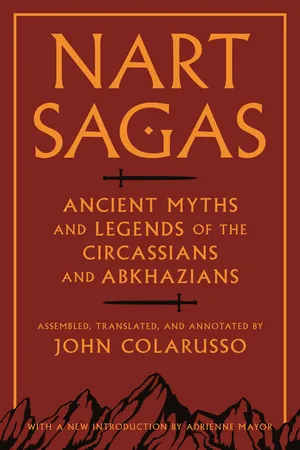
- 456 pages
- English
- ePUB (mobile friendly)
- Available on iOS & Android
About this book
The sagas of the ancient Narts are to the Caucasus what Greek mythology is to Western civilization. This book presents, for the first time in the West, a wide selection of these fascinating myths preserved among four related peoples whose ancient cultures today survive by a thread. In ninety-two straightforward tales populated by extraordinary characters and exploits, by giants who humble haughty Narts, by horses and sorceresses, Nart Sagas from the Caucasus brings these cultures to life in a powerful epos.
In these colorful tales, women, not least the beautiful temptress Satanaya, the mother of all Narts, are not only fertility figures but also pillars of authority and wisdom. In one variation on a recurring theme, a shepherd, overcome with passion on observing Satanaya bathing alone, shoots a "bolt of lust" that strikes a rock--a rock that gives birth to the Achilles-like Sawseruquo, or Sosruquo. With steely skin but tender knees, Sawseruquo is a man the Narts come to love and hate.
Despite a tragic history, the Circassians, Abazas, Abkhaz, and Ubykhs have retained the Nart sagas as a living tradition. The memory of their elaborate warrior culture, so richly expressed by these tales, helped them resist Tsarist imperialism in the nineteenth century, Stalinist suppression in the twentieth, and has bolstered their ongoing cultural journey into the post-Soviet future.
Because these peoples were at the crossroads of Eurasia for millennia, their myths exhibit striking parallels with the lore of ancient India, classical Greece, and pagan Scandinavia. The Nart sagas may also have formed a crucial component of the Arthurian cycle. Notes after each tale reveal these parallels; an appendix offers extensive linguistic commentary. With this book, no longer will the analysis of ancient Eurasian myth be possible without a close look at the Nart sagas. And no longer will the lover of myth be satisfied without the pleasure of having read them.
Excerpts from the Nart sagas
"The Narts were a tribe of heroes. They were huge, tall people, and their horses were also exuberant Alyps or Durduls. They were wealthy, and they also had a state. That is how the Narts lived their lives. . . ."
"The Narts were courageous, energetic, bold, and good-hearted. Thus they lived until God sent down a small swallow. . . ."
"The Narts were very cruel to one another. They were envious of one another. They disputed among themselves over who was the most courageous. But most of all they hated Sosruquo. . . . A rock gave birth to him. He is the son of a rock, illegally born a mere shepherd's son. . . ."
In a new introduction, folklorist Adrienne Mayor reflects on these tales both in terms of the fascinating warrior culture they depict and the influence they had on Greco-Roman mythology.
Frequently asked questions
- Essential is ideal for learners and professionals who enjoy exploring a wide range of subjects. Access the Essential Library with 800,000+ trusted titles and best-sellers across business, personal growth, and the humanities. Includes unlimited reading time and Standard Read Aloud voice.
- Complete: Perfect for advanced learners and researchers needing full, unrestricted access. Unlock 1.4M+ books across hundreds of subjects, including academic and specialized titles. The Complete Plan also includes advanced features like Premium Read Aloud and Research Assistant.
Please note we cannot support devices running on iOS 13 and Android 7 or earlier. Learn more about using the app.
Information


Table of contents
- Cover Page
- Title Page
- Copyright Page
- Dedication Page
- Contents
- Foreword
- Preface
- Symbols and Abbreviations
- Maps
- Introduction
- A Selection of the Circassian Nart Corpus
- The Abaza Nart Corpus
- A Selection of the Abkhaz Corpus
- The Ubykh Nart Corpus
- Bibliography